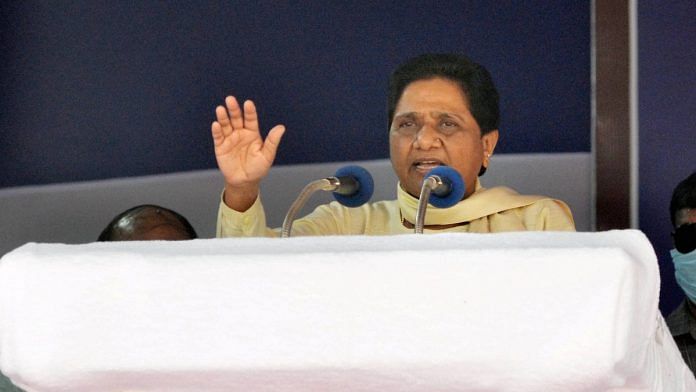Bahujan Samaj Party chief Mayawati is straining every nerve for the Uttar Pradesh assembly election due next year because she knows it’s a do-or-die situation for her. But more than the relevance of one political leader, what’s at stake in the 2022 UP election is the very idea of a ‘mainstream’ Dalit party, which the BSP broke new grounds to become one in Indian politics.
The former Uttar Pradesh chief minister has been aggressively hitting out at the ruling Bharatiya Janata Party, the Congress, as well as the Samajwadi Party. The SP, in fact, was her ally in the 2019 Lok Sabha election. Mayawati, however, is taking no chances this time. The idea, of course, is to amplify the message that the BSP chief is a prime contender in the forthcoming election.
Mayawati knows how crucial this election is for her, given the string of disappointing electoral performances the last few years, and the BJP’s spectacular performance in the state as well as its aggressive forays into what has been her core vote bank.
But beyond keeping Mayawati relevant, the BSP’s performance in 2022 will be a marker for determining whether the idea of an ambitious Dalit party lives or dies.
Also Read: Dear media, stop Chandrashekhar Azad vs Mayawati tales. Dalits can have more than one leader
Mayawati’s slide
Mayawati stunned the Indian political arena by storming to power in the 2007 Uttar Pradesh elections, winning 206 of the 403 seats with a 30 per cent vote share. This was a significant jump from the party’s 2002 performance, in which it won 98 seats and a 23 per cent vote share.
The 2007 performance was no fluke. It was a result of astute planning — most notably declaring candidates a year in advance and stitching together a unique rainbow coalition of Dalits and Brahmins, along with Muslims — and playing on the less-than-favourable image of the Samajwadi Party on the ground.
This rise, however, was the one before the proverbial fall. Mayawati, while having an iron grip on the administration, came to be known for her distant, aloof approach – rarely seen on the roads or hitting the ground.
In the next assembly election in 2012, the BSP’s seats fell to 80, and vote share to 25.9 per cent. And by 2017, to 19 and 22.23 per cent, respectively.
The Lok Sabha election has hardly offered much solace either. From 21 seats in 2009 to zero in 2014, and then ten in 2019 when it was in an alliance with the SP — it’s been a bit of a tricky ride for Mayawati.
Essentially, Mayawati, who started off with a wide Dalit base, and who once managed to marry that into a larger caste coalition, has now been reduced to getting support from the Jatav community in her constituency and a few Muslim pockets. The BJP, meanwhile, has eaten into the non-Jatav Dalit vote bank, with the Congress and SP also eyeing their share of the pie. Dalits constitute roughly 20 per cent of UP’s population, with Jatavs comprising around 12 per cent.
Also Read: There’s a new Shudra-Dalit unity in north Indian villages thanks to the farm protests
Death of the Bahujan vote
The Bahujan Samaj Party, in a way, changed the paradigm of Indian politics to become a truly mainstream party with Dalit empowerment agenda at its core. Its relegation to the fringes, therefore, has more far-reaching consequences than just Mayawati’s decline.
Think about it. Which other Dalit-centric party has ever erupted onto the scene like the BSP did? There are various streams of Ambedkar’s Republican Party of India (RPI). There is Union Minister Ramdas Athawale who is a known figure. And then there are independent outfits like Chandrashekhar Azad’s Bhim Army, which grew into prominence almost overnight.
None of them, however, have the appeal the BSP has exuded — making Dalits, especially in north India, believe they don’t have to remain on the fringes of Indian politics as an additional vote bank for upper-caste parties, or be limited to smaller players like the RPIs or the Bhim Army for representation.
BSP is as ‘mainstream’ as a party can be. Mayawati has been chief minister of India’s most politically and electorally crucial state, and was even talked about as a possible PM candidate. Sure, she did expand her base to other castes, especially Brahmins, and is still talking about saving ‘Sarvajan’ (all sections of society) but at the core of her party and politics are the Dalits.
What happens to the Dalit vote, including Jatavs, if Mayawati no longer remains a serious player? It gets fragmented among upper caste parties like the BJP and the Congress, and gets diluted to an ‘extra’ vote, and appropriated by these parties.
Also Read: Akhilesh must start building a new UP coalition. He can begin by saying sorry to Dalits
Mayawati has made many political blunders and failed to keep her base intact, forget about adapting to changing times and expanding it further. She has groomed no second rung, and her party’s Brahmin face, Satish Chandra Mishra, remains the only other BSP leader with some heft. But the BSP, founded by her mentor Kanshi Ram, who worked for the mobilisation of Dalits to give them a political identity, is among the most crucial and significant chapters of Indian politics.
The former CM has everything at stake in the forthcoming UP election, but the entire concept of Dalit politics and its relevance has much more to lose if Mayawati flounders again.
Views are personal.
(Edited by Srinjoy Dey)



